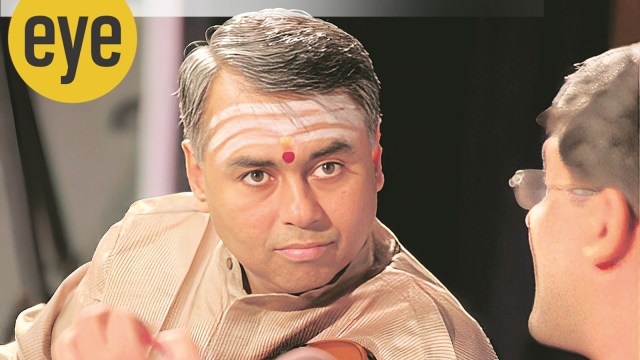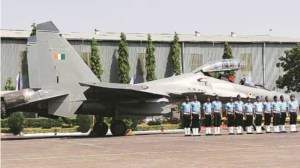Sangita Kalanidhi 2025 winner RK Shriramkumar on the world of Carnatic music, his lineage and navigating disparate ideologies
The 58-year-old Shriramkumar, in a career spanning over four decades and various aesthetics, has not only accompanied MS Subbulakshmi and TM Krishna but also represents a musical thought that goes beyond ideology and politics
 RK Shriramkumar
RK Shriramkumar When the Music Academy in Chennai announced the prestigious Sangita Kalanidhi Award (2025) for violinist RK Shriramkumar last month, it felt as if the world of Carnatic music was bridging its recent polar past. “It was a complete surprise. I had of course not expected it,” says Shriramkumar
The 58-year-old, in a career spanning over four decades and various aesthetics, has not only accompanied MS Subbulakshmi, the vocal gold standard in independent India, but has also been a trusted collaborator for Carnatic vocalist TM Krishna, a musician who has questioned the construct of the art form, Brahminical hegemony and rejected the idea of putting art and politics in neat boxes.
It is Krishna’s views on Subbulakshmi — about her Devadasi roots and questions on whether the Carnatic community would have still built a halo around her and treated her like a deity if she had not “Brahminised” herself or was dark-skinned — that divided the world of Carnatic music last year after Sangita Kalanidhi was announced for him. That Shriramkumar could be trusted as a musical ally by both Subbulakshmi and Krishna is a rare feat. Interestingly, Shriramkumar has also accompanied Ranjani-Gayatri, the duo who withdrew from the December Music Season after the Sangita Kalanidhi was conferred on Krishna and were quite vocal in their criticism.
Chennai-based Shriramkumar’s presence with all of them represents a musical thought that goes beyond ideology, to a philosophy that does not consider various ways of thinking as a perilous road. Not overly vocal or political about matters of the Carnatic music world, Shriramkumar speaks through his music. It is listening with utmost attention that has helped him adapt to the style of various artistes, including colossal names such as Semmangudi Srinivasa Iyer, DK Pattammal, DK Jayaraman, T Brinda, and T Muktha. Among the current crop of senior artistes, he has worked with Bombay Jayashri and Sudha Ragunathan, among others. He also plays very often with the younger generation of talented artistes and is often heard alongside Aishwarya Vidhya Raghunath and Ramakrishnan Murthy.
 Shriramkumar in a concert with MS Subbulakshmi
Shriramkumar in a concert with MS Subbulakshmi
“How do I cope with the ideological differences? What I find important is that all of them respect art and each other’s art. Krishna and I perennially argue and disagree on so many things. But the wonderful thing about him is that he allows me freedom to hold on to my ideals. He does not tamper with that. Krishna wouldn’t have been able to connect with Carnatic music the way he does, if he did not respect the ethos of it,” says the soft-spoken Shriramkumar, an acknowledged authority on the 19th-century composer and writer Subbarama Dikshitar — nephew of the poet-saint Muthuswami Dikshitar, one of the holy trinity of Carnatic music (the other two being Tyagaraja and Syama Sastri).
Shriramkumar comes from an illustrious musical lineage, the roots of which are entrenched in Karnataka’s Rudrapatna village or the ‘village of music’ on the banks of the Kaveri. The grandson of violin maestro RK Venkatarama Shastry and grand-nephew of the revered vocalist RK Srikantan, who was one of Carnatic music’s most venerated vocalists, Shriramkumar’s music is, in many ways, a reflection of that pedigree. Here, music has not been just an adornment, it is a way of life. “The culture of music at home was always there. You went to school, rushed through a snack and then sat down for the violin class,” says Shriramkumar, who also has a degree in mathematics.
But to call him only a keeper of the music would be unjust to the nuanced, intellectual dynamism he brings to any performance.
Trained initially under the aegis of Savitri Satyamurthy and later mentored by his grandfather, Shriramkumar also refined his musicality under VV Subrahmanyam, the violinist who played with Subbulakshmi for years. He then imbibed vocal training under the tutelage of vocal giant DK Jayaraman, vocalist DK Pattamal’s brother and one of the most precise and gentle interpreters of Carnatic compositions. “From the time I was learning, I was taught to sing. With this instrument, I believe that you play the way you sing,” says Shriramkumar, referring to capturing on the violin the tiniest shruthis and gamakas that vocalists train themselves to deliver.
Krishna, who has known Shriramkumar even before his own debut at the Music Academy in 1988 when he was 12 and Shriramkumar about 22, feels that Shriramkumar’s musical expression, in many ways, “epitomises the most profound qualities of Carnatic music: in terms of tonality, the Carnatic accent and with a great emphasis on retaining the acoustic quality.”
“Whether he is presenting the raaga in terms of improvisation or as a composition, you will hear it in its truest sense, with the legacy of the raaga expressed extraordinarily… He has his own set of musical ethics, his own individualistic sense of presenting the music: the way it should sound or should be shared. As a partner on stage, I think Shriram and I share very similar ideas,” says Krishna.
After his debut at 15, Shriramkumar performed often with Subbulakshmi and imbibed various new compositions, including those from other languages. Shriramkumar believes that she and the others not only gave him musical knowledge but also lessons in how to conduct oneself. “MS amma was such a great musician but she was so grounded. Whatever accolades she received, she took it with such grace and humility. In fact, sitting with these brilliant artistes was its own learning. Beyond the compositions, it was also about conducting oneself well; to be kind. Performing with her gave me a lot of visibility,” says Shriramkumar.
The result of these associations has been a rare instrumentalist who thinks like a singer and whose musical idiom moves with the syntax of voice, accompanied by a surrender to the music’s truth. It’s not just about bowing one phrase after the other. Krishna feels that Shriramkumar has been able to gather from the masters the most profound qualities of that music. “He didn’t just share the stage with them, he engaged actively with them, asking them questions, looking at different perspectives that each one had toward their music… this has greatly enriched his own perspective.”
 Shriramkumar accompanying TM Krishna
Shriramkumar accompanying TM Krishna
Shriramkumar is also known to be a generous teacher. But he feels it comes from a somewhat self-serving space. “When you teach, it allows you to introspect and think about your music. Through teaching, I have corrected so many of the mistakes that I had been making for years,” says Shriramkumar.
Last year, the Sangita Kalanidhi Award was at the centre of the maelstrom with Krishna’s advocacy for inclusivity and democratisation of Carnatic music, besides his views on Subbulakshmi finding kickback from traditionalists. So much so that the music stage of Carnatic music has now become a very polarised space. Shriramkumar is aware of that inflection point but believes that what cannot change is a musician’s responsibility towards her music. “I think the music and its values must be upheld. It should be an environment devoid of any hate and negativity. Music is a sacred space. Every musician has to be responsible for the music. They need to have that integrity. I cannot dilute or compromise the values of the music,” says Shriramkumar, who will preside over the Music Academy’s conference this year in December.





- 01
- 02
- 03
- 04
- 05

























